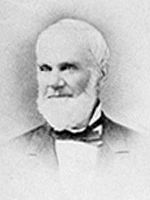Sayles Jenks Bowen
| Sayles Jenks Bowen | |
|---|---|
 |
|
| Born |
October 7, 1813 Scipio, New York, United States |
| Died | December 16, 1896 (aged 83) Washington, D.C., United States |
Sayles Jenks Bowen (7 October, 1813 – 16 December, 1896) son of Josiah Bowen and Deborah Jenks, was the twentieth Mayor of Washington City, District of Columbia, from 1868 to 1870. Bowen was one of the most controversial mayors in the history of the American capital, because of his outspoken support of emancipation and racial integration.
Bowen was born in Scipio, New York in 1813. He married Mary Baker in 1835 and moved with her to Washington, D.C. to begin business as a merchant. President James K. Polk appointed Bowen to a clerkship in the Treasury Department in 1845, but revoked the appointment three years later when Bowen gained the reputation of a radical for distributing abolitionist propaganda; additionally, he supported Freesoil candidate Martin Van Buren in that year's presidential election rather than Polk's preferred successor, Lewis Cass. For the next six years Bowen prosecuted claims against the U.S. government, then became a founder of, and staunch activist for, the new Republican Party.
Upon his inauguration as President in 1861, Abraham Lincoln appointed Bowen as Police Commissioner for the District of Columbia, beginning the latter's career in city politics. The following year he became Tax Collector for the District, and in 1863 was appointed the D.C. postmaster.
In 1868, Bowen was nominated by the Republicans as a candidate for Mayor of Washington against Democrat John T. Given. At that time, post-Civil War Washington had been ravaged by the war and by a desperate shortage of funds from Congress; the city had deteriorated so badly that there was much talk in the Federal sector of relocating the seat of government to St. Louis. Bowen ran for mayor under the slogan "A vote for Bowen is a vote for keeping the capital in Washington." In that year's July election, blacks voted in Washington for the first time, and because of Bowen's famous support of civil rights, he received narrow support from white voters and overwhelming support from black ones. The margin was extremely narrow in favor of Bowen, but close enough to necessitate a recount by the City Councils; however, while it was still proceeding, the Republicans on the recount committee (including the most powerful Republican politician in the District, Alexander Robey Shepherd) publicly declared Bowen the winner and he took office.
...
Wikipedia
